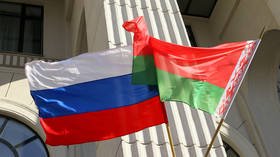As Belarus ends partnership with EU, Minsk plans to merge tax system with Russia & establish common markets for energy, transport

Neighbors Russia and Belarus plan to further deepen their close economic ties by creating multiple integrated markets and working together to unify vital tax and customs legislation, Minsk’s representative in Moscow has revealed.
Vladimir Semashko, the Belarusian ambassador to Russia, explained on Monday that the pair were working towards uniting their energy and transport sectors, and would also be making plans to transition to a joint industrial and agricultural policy. The two nations expect to have concluded this by January 1, 2022, he said.
The move came on the same day that Belarus announced it would be withdrawing from the European Union’s ‘Eastern Partnership’, a scheme designed to pull former Soviet states into Brussels’ orbit and away from Russia.
Also on rt.com Belarus to become first state to leave EU’s Eastern Partnership, Minsk will recall envoy & cut ties in face of Brussels’ sanctionsMinsk and Moscow have been part of a so-called Union State since 1999, when current Belarusian leader Alexander Lukashenko and the former Russian President Boris Yeltsin signed a treaty and agreed to begin integration. According to the document’s text, the two nations planned to create a joint parliament, court, and cabinet. Since then, unification has regularly been discussed, including the creation of a shared currency, military, and customs space. However, 22 years later, many of these ideas are yet to come to fruition.
“Much has already been done [to integrate] in social policy, economic policy, defense, and so on,” Semashko told Belarusian state media agency BelTA. “Today, we have really reached the time when we have to bolster the economic foundation of the union of Belarus and Russia.”
The ambassador noted that the two countries would work on integrating 28 sectors of the economy, including oil, gas, and electricity. They would also be focusing on unifying tax and customs legislation, he said.
“We are now at a fundamentally new stage,” he noted, explaining that Belarusian-Russian trade turnover had increased by 30% in the past year. Minsk is Moscow’s fourth-largest trading partner.
Further integration of Russia and Belarus has long been discussed, with both President Lukashenko and his Russian counterpart, Vladimir Putin, regularly returning to the topic. Discussions between the two leaders have intensified in recent months, especially following the unrest in Belarus after last year’s disputed presidential election and the subsequent Western interest in working with Svetlana Tikhanovskaya. Her supporters claim she was the real winner of the contest.
Earlier this month, Belarusian Prime Minister Roman Golovchenko revealed that negotiations between Moscow and Minsk were “entering the home stretch.”
Think your friends would be interested? Share this story!












